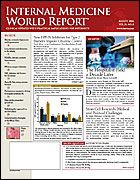Publication
Article
New Recommendations for Treating Alzheimer's-Induced Dementia
Author(s):
Accumulating evidence of effective treatments for patients with dementia linked to Alzheimer’s disease (AD) prompted the American Association for Geriatric Psychiatry (AAGP) to issue a position statement covering the principles of care for this expanding patient population.
“We are clearly in a period where we should all be thinking of Alzheimer’s as a condition we can treat, even though we do not have a cure yet,” said Constantine Lyketsos, MD, MHS, professor at Johns Hopkins School of Medicine in Baltimore and chair of the task force that issued the new statement.
AD dementia currently affects more than 4.5 million Americans, and more than 90% of them also have neuropsychiatric symptoms, such as agitation, aggression, delusions, hallucinations, repetitive vocalizations, and wandering.
The AAGP statement focuses on the following treatment recommendations:
• Symptoms of diminished cognitive function in patients with mild-to-moderate AD can be treated with any one of the 3 cholinesterase inhibitors (CEIs)-donepezil (Aricept), rivastigmine (Exelon), or galanthamine (Razadyne), but not tacrine (Cognex)-or with memantine (Namenda), possibly combined with a CEI.
• For neurocognitive symptoms, treatment should begin with nondrug therapies, including cognitive interventions (eg, reorientation, reminders), environmental modifications (reducing ambient noise, removing clutter, providing familiar objects), changes in activity demand (eg, establishing routines and scheduling, reducing the complexity of activities), and interpersonal approaches (eg, simplifying language, using/ avoiding touch).
• For neurocognitive symptoms that do not respond to nonpharmacologic methods, drug treatment is appropriate. Drug therapy can be based on treating specific symptoms, for example, antidepressants for anxiety symptoms such as repetitive vocalization or pacing, or empirical therapy using agents that have shown efficacy for these symptoms, such as atypical antipsychotics. This, however, should be done only after discussing the risks and benefits of such drugs with patients and their caregivers.
• Supportive care includes ensuring patient safety (eg, driving, living alone, environmental hazards), structuring day-to-day living to maximize remaining abilities and function, monitoring general medical health, and encouraging patients to complete advance directives.
The AAGP statement also addresses the following critical interventions for caregivers-education (eg, changing role from family member to caregiver, avoiding arguments with the patient); teaching problem-solving skills; encouraging long-range planning; and emphasizing the importance of emotional support and taking breaks from their caregiving.
The guidelines are available at www.aagponline.org/prof/position_caredmnalz.asp
Results of a recent study suggest a new approach to AD prevention (Neurobiol Aging. 2006 June 10; online ahead of print). Investigators have identified a faulty molecule in the brain, membrane-bound insulin-degrading enzyme, which may be responsible for the progression of mild cognitive impairment to mild AD dementia. If confirmed, pharmacologically boosting insulin-degrading enzyme activity could reverse the beta-amyloid peptide accumulation characteristic of early-stage AD.






